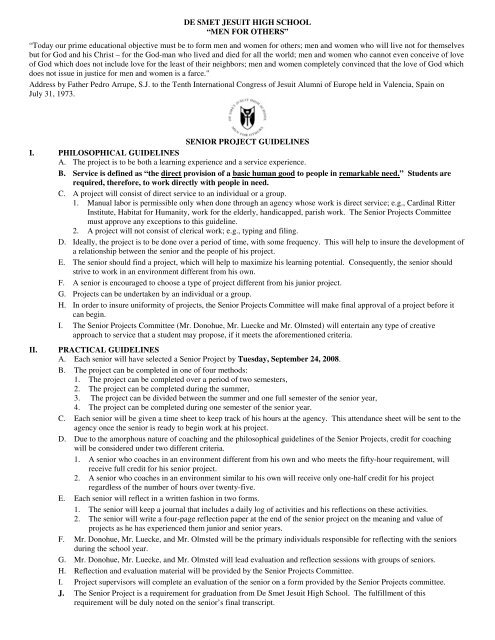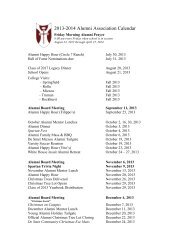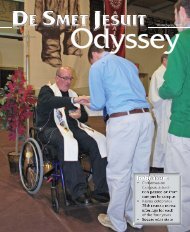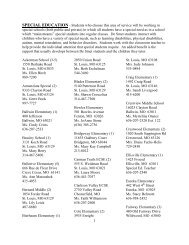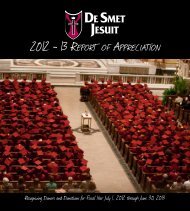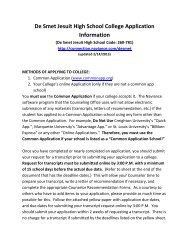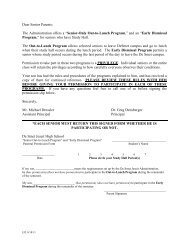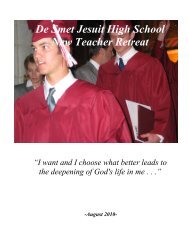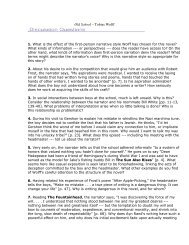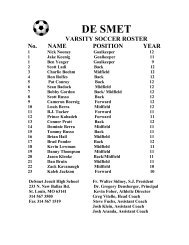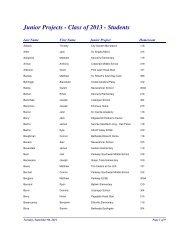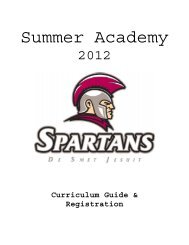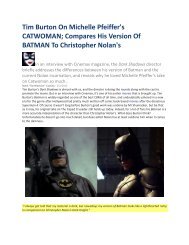MEN FOR OTHERS - DeSmet Jesuit High School
MEN FOR OTHERS - DeSmet Jesuit High School
MEN FOR OTHERS - DeSmet Jesuit High School
You also want an ePaper? Increase the reach of your titles
YUMPU automatically turns print PDFs into web optimized ePapers that Google loves.
DE SMET JESUIT HIGH SCHOOL<br />
“<strong>MEN</strong> <strong>FOR</strong> <strong>OTHERS</strong>”<br />
“Today our prime educational objective must be to form men and women for others; men and women who will live not for themselves<br />
but for God and his Christ – for the God-man who lived and died for all the world; men and women who cannot even conceive of love<br />
of God which does not include love for the least of their neighbors; men and women completely convinced that the love of God which<br />
does not issue in justice for men and women is a farce."<br />
Address by Father Pedro Arrupe, S.J. to the Tenth International Congress of <strong>Jesuit</strong> Alumni of Europe held in Valencia, Spain on<br />
July 31, 1973.<br />
SENIOR PROJECT GUIDELINES<br />
I. PHILOSOPHICAL GUIDELINES<br />
A. The project is to be both a learning experience and a service experience.<br />
B. Service is defined as “the direct provision of a basic human good to people in remarkable need.” Students are<br />
required, therefore, to work directly with people in need.<br />
C. A project will consist of direct service to an individual or a group.<br />
1. Manual labor is permissible only when done through an agency whose work is direct service; e.g., Cardinal Ritter<br />
Institute, Habitat for Humanity, work for the elderly, handicapped, parish work. The Senior Projects Committee<br />
must approve any exceptions to this guideline.<br />
2. A project will not consist of clerical work; e.g., typing and filing.<br />
D. Ideally, the project is to be done over a period of time, with some frequency. This will help to insure the development of<br />
a relationship between the senior and the people of his project.<br />
E. The senior should find a project, which will help to maximize his learning potential. Consequently, the senior should<br />
strive to work in an environment different from his own.<br />
F. A senior is encouraged to choose a type of project different from his junior project.<br />
G. Projects can be undertaken by an individual or a group.<br />
H. In order to insure uniformity of projects, the Senior Projects Committee will make final approval of a project before it<br />
can begin.<br />
I. The Senior Projects Committee (Mr. Donohue, Mr. Luecke and Mr. Olmsted) will entertain any type of creative<br />
approach to service that a student may propose, if it meets the aforementioned criteria.<br />
II.<br />
PRACTICAL GUIDELINES<br />
A. Each senior will have selected a Senior Project by Tuesday, September 24, 2008.<br />
B. The project can be completed in one of four methods:<br />
1. The project can be completed over a period of two semesters,<br />
2. The project can be completed during the summer,<br />
3. The project can be divided between the summer and one full semester of the senior year,<br />
4. The project can be completed during one semester of the senior year.<br />
C. Each senior will be given a time sheet to keep track of his hours at the agency. This attendance sheet will be sent to the<br />
agency once the senior is ready to begin work at his project.<br />
D. Due to the amorphous nature of coaching and the philosophical guidelines of the Senior Projects, credit for coaching<br />
will be considered under two different criteria.<br />
1. A senior who coaches in an environment different from his own and who meets the fifty-hour requirement, will<br />
receive full credit for his senior project.<br />
2. A senior who coaches in an environment similar to his own will receive only one-half credit for his project<br />
regardless of the number of hours over twenty-five.<br />
E. Each senior will reflect in a written fashion in two forms.<br />
1. The senior will keep a journal that includes a daily log of activities and his reflections on these activities.<br />
2. The senior will write a four-page reflection paper at the end of the senior project on the meaning and value of<br />
projects as he has experienced them junior and senior years.<br />
F. Mr. Donohue, Mr. Luecke, and Mr. Olmsted will be the primary individuals responsible for reflecting with the seniors<br />
during the school year.<br />
G. Mr. Donohue, Mr. Luecke, and Mr. Olmsted will lead evaluation and reflection sessions with groups of seniors.<br />
H. Reflection and evaluation material will be provided by the Senior Projects Committee.<br />
I. Project supervisors will complete an evaluation of the senior on a form provided by the Senior Projects committee.<br />
J. The Senior Project is a requirement for graduation from De Smet <strong>Jesuit</strong> <strong>High</strong> <strong>School</strong>. The fulfillment of this<br />
requirement will be duly noted on the senior’s final transcript.
PROCEDURES <strong>FOR</strong> COMPLETING A SENIOR PROJECT<br />
1. A senior project may be chosen from the booklet of agencies distributed by the Senior Project coordinators. Projects not listed in this booklet<br />
must be approved by Mr. Donohue, Mr. Luecke or Mr. Olmsted.<br />
2. Once a project has been selected and approved, the senior must complete a contract provided by the school. (This contract can be picked up at<br />
the Athletic Office or downloaded from the De Smet website at www.desmet.org.<br />
3. Once the contract has been received at De Smet, a senior project packet will be mailed to the agency of your choice. (The De Smet fax is<br />
314-567-1519. The mailing address is 233 North New Ballas, St. Louis, MO 63141.) The packet contains an explanation of the program to<br />
the supervisor. It is your responsibility to inform Mr. Donohue, Mr. Luecke or Mr. Olmsted of your project choice along with the full address<br />
of the agency and the name of the contact person. Each of these teachers can be contacted on voice mail at De Smet at 567-3500: Mr. Donohue<br />
(409), Mr. Luecke (245), Mr. Olmsted (435) or by email at kluecke@desmet.org, ddonohue@desmet.org or folmsted@desmet.org.<br />
4. There is a SIGN-IN SHEET on which you are to record your hours throughout the project. Your supervisor will give this sheet to you when<br />
you begin the project. Keep it in a convenient place at your project so that you can record your hours each time. It is your responsibility to<br />
make sure that your time is recorded properly and verified by your supervisor.<br />
5. Keep a journal of your activities each time that you work at your project. You are to present this journal to Mr. Donohue, Mr. Luecke or Mr.<br />
Olmsted when you complete your project. Definitely do your journal entry the day of your work. This helps to keep the experience fresh in<br />
your mind.<br />
6. Your project is complete when the school has received the following:<br />
a. An evaluation from your supervisor. (A form for this evaluation is in the packet.)<br />
b. A daily journal of your activities and reflections.<br />
c. Your sign-in sheet.<br />
d. A four-page reflection paper on your Junior and Senior Projects combined. (This paper should contain what you feel that you contributed<br />
and learned from both your Junior and Senior Projects.)<br />
7. The Project Reflection Paper is to be four pages in length. It is to cover the work that you did at both your Junior and Senior Projects. Briefly<br />
describe the kind of work that you did at both placements. Additionally, you are to reflect upon what you contributed in each situation as well<br />
as reflect on what effect the project experience had on you. We would like you to incorporate into your paper an analysis or reflection of how<br />
“The fundamental option for the poor” related to your work. You may also include in your paper any other reflections that you might have<br />
about the project experience in general and about De Smet’s goal of educating students to be “Men for Others.” Criticisms of the project<br />
program are welcome but we ask that the nature of your criticism be constructive to positively help us make adjustments in the program.<br />
8. For projects completed during the summer, the reflection paper, the journal and accompanying paperwork are due on Tuesday,<br />
September 11, 2007 in the Pastoral Office or Athletic Director’s Office. For projects completed during the school year, the required<br />
paperwork is due two weeks after the completion of the project. Failure to meet these stated deadlines will result in the student’s<br />
attendance at after school sessions in room 113 until the paperwork is completed.<br />
9. The Senior Project and all paperwork must be completed by Friday, April 24, 2009.<br />
10. If you have any questions about the projects, the paper or any other related matter, please feel free to contact us at 567-3500.<br />
“Kairos”<br />
“Kairos” – “The Lord’s Time.” All time is holy. It belongs to God and we are stewards of it. Our responsibility as men and women of De Smet is to<br />
understand that every moment is the Lord’s and that we must dedicate ourselves to bringing about God’s Kingdom.<br />
“Live the fourth.” We are called to put into practice in our daily lives what we believe in faith.<br />
As juniors you were given time as part of your education to serve and to learn from those in need. You gave the gift of your talents. As a senior you are<br />
asked to live out on your own time, as part of the fabric of your life, the gospel call to serve the poor.<br />
As you prepare for this mission, pray that you may see clearly your gifts. Pray that you may understand where your time and talent can best be utilized for<br />
building up God’s Kingdom. Where can you exercise the “fundamental option for the poor?” Where is the greatest need of your talent and service? Focus on how you<br />
can incorporate service into your daily life and how you can use your talents for the “greater glory of God.”<br />
Pray the prayer of generosity of St. Ignatius while you ponder your gifts and your call to service.<br />
Lord, teach me to be generous.<br />
Teach me to serve You as You deserve,<br />
to give and not to count the cost,<br />
to fight and not to heed the wounds,<br />
to toil and not to seek for rest,<br />
to labor and not to ask for reward,<br />
save that of knowing that I am doing Your will.<br />
Amen.<br />
Important Dates<br />
May 15-16<br />
May 22<br />
May 27 1<br />
August 26<br />
September 10<br />
September 23<br />
September 24<br />
April 24<br />
Presentation of Senior Project Program in junior religion classes.<br />
Letter to parents regarding Senior Project Program.<br />
First day that a Senior Project can commence.<br />
Second Senior Project presentation in senior religion classes. Letter on project to parents.<br />
Paperwork due by those completing their service project during the summer.<br />
Reflection session in senior religion classes.<br />
Due date for selection of a project to be done during the school year.<br />
Final date to complete senior project hours and paperwork.


